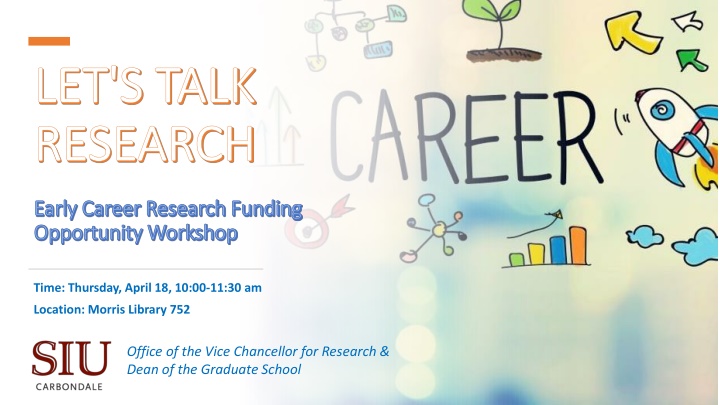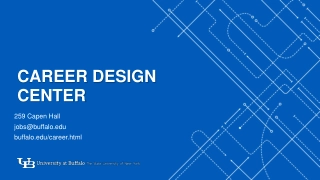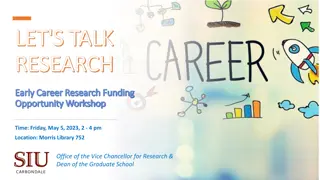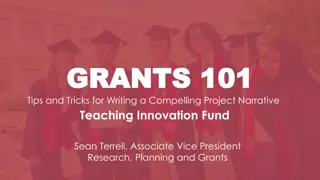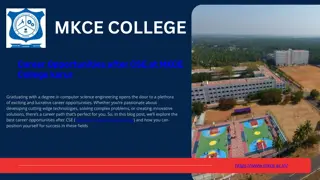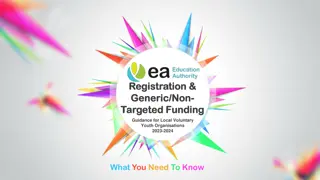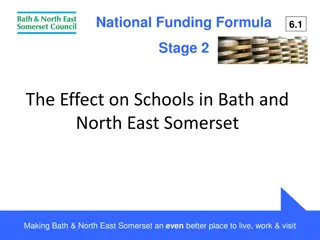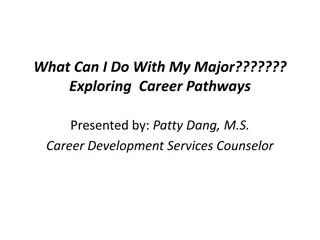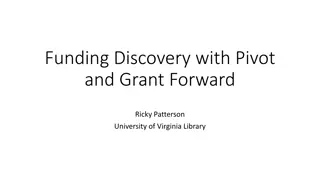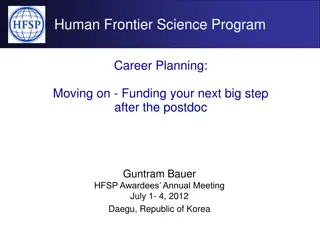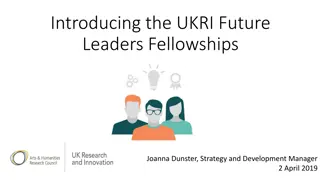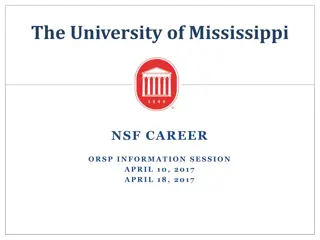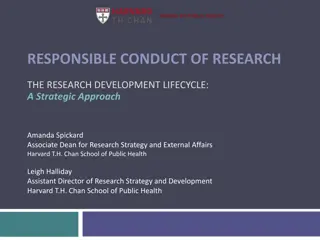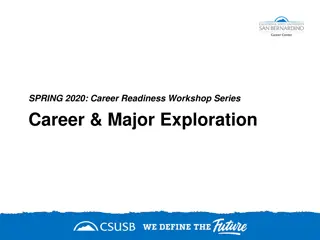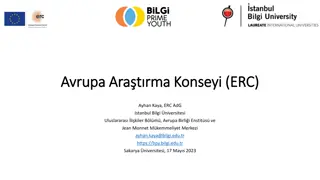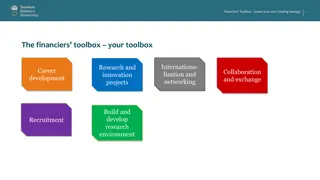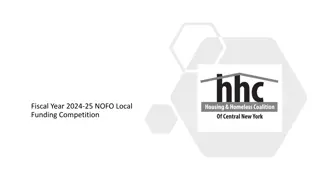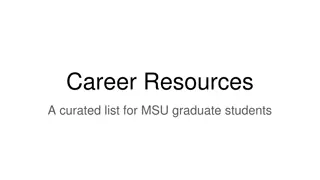Early Career Research Funding Opportunities Workshop
Join the Early Career Research Funding Opportunities Workshop on Thursday, April 18, at 10:00-11:30 am in Morris Library 752. Learn about funding programs like ONR YIP, AFOSR YIP, ARO YIP, and DARPA YFA supporting young researchers in various fields. These programs offer substantial grants for innovative research projects. Don't miss this chance to explore funding opportunities for your early career development.
Download Presentation

Please find below an Image/Link to download the presentation.
The content on the website is provided AS IS for your information and personal use only. It may not be sold, licensed, or shared on other websites without obtaining consent from the author.If you encounter any issues during the download, it is possible that the publisher has removed the file from their server.
You are allowed to download the files provided on this website for personal or commercial use, subject to the condition that they are used lawfully. All files are the property of their respective owners.
The content on the website is provided AS IS for your information and personal use only. It may not be sold, licensed, or shared on other websites without obtaining consent from the author.
E N D
Presentation Transcript
LET'S TALK LET'S TALK RESEARCH RESEARCH Early Career Research Funding Early Career Research Funding Opportunity Workshop Opportunity Workshop Time: Thursday, April 18, 10:00-11:30 am Location: Morris Library 752 Office of the Vice Chancellor for Research & Dean of the Graduate School
ONR YIP ONR YIP The Office of Naval Research (ONR) Young Investigator Program seeks to identify and support academic scientists and engineers who are in their first or second full-time tenure-track or tenure-track-equivalent academic appointment. The principal investigator of a proposal must be a U.S. citizen, national or permanent resident (on the date proposals are due), holding a first or second full- time tenure-track or tenure-track-equivalent faculty position, and has received his/her doctorate or equivalent degree within the past seven years. The FY24 Young Investigator Program (YIP) accepts proposals until April 30, 2024 5:00 p.m. EST. MUST include at least one letter of support Up to $750,000 for 3 years For FY2024, nearly 220 proposals were received, resulting in 24 awards
AFOSR YIP AFOSR YIP The 2025 Air Force Young Investigator Research Program (YIP) intends to support young in career scientists and engineers who are showing exceptional ability and promise for conducting basic research. The program objective is to foster creative basic research in science and engineering; enhance early career development of outstanding young investigators; and increase opportunities for the young investigator to recognize the Air Force mission and related challenges in science and engineering.. The principal investigator of a proposal must be a U.S. citizen, national or permanent resident, holding a full-time tenure-track or tenure-track-equivalent faculty position, and has received his/her doctorate or equivalent degree by 1 April 2017 or later. The FY25 Young Investigator Program (YIP) accepts proposals by June 21, 2024. Up to $450,000 for 3 years Awarded 48 Young Investigator Program grants for 2024
ARO YIP ARO YIP The Army s Research Office Young Investigator Research Program (YIP) intends to attract outstanding young university faculty members to pursue fundamental research in areas relevant to the Army, to support their research in these areas, and to encourage their teaching and research careers. Research areas of interest are mechanical sciences, mathematical sciences, electronics, computing science, physics, chemistry, life sciences, materials science, network science, and environmental sciences. The principal investigator of a proposal must be a U.S. citizen, national or permanent resident, holding a full-time tenure-track or tenure-track-equivalent faculty position. PhD or equivalent must be held for fewer than 5 years. Proposals are accepted anytime. Up to $360,000 for 3 years
DARPA YFA DARPA YFA The objective of the DARPA Young Faculty Award (YFA) program is to identify and engage rising stars in junior research positions, emphasizing those without prior DARPA funding, and expose them to DoD needs and DARPA s program development process Proposers must be one of the following: current Tenure-Track Assistant/Associate Professors; current Tenured faculty within 3 years of their Tenure date. Citizenship not required. Engagement with DARPA: Each YFA Awardee has a PM Mentor with closely aligned research interests The annual meeting provides networking opportunities and presentations from DARPA Technical Offices, military liaisons, and industry representatives YFA Awardees have the opportunity to visit military installations, defense- relevant research facilities, or participation in training exercises YFA awardees are invited to present their work at Program Review meetings, providing networking opportunities with PMs and other performers PM Mentors can nominate YFA Awardees to receive an additional $500K Director s Fellowship option. Up to $500,000 for 2 years
Recommendations Recommendations Register in SIUC s PIVOT Contact program managers: virtually or in person Attend webinars about specific announcement Study the FAQs (and submit questions yourselves) Respond to RFIs Contact program managers: virtually or in person
DoE Early Career Research DoE Early Career Research Program Program The DOE Office of Science is the nation s largest supporter of basic research in the physical sciences. Early career researchers may apply to one of eight Office of Science program offices: Advanced Scientific Computing Research; Biological and Environmental Research; Basic Energy Sciences; Fusion Energy Sciences; High Energy Physics; Nuclear Physics; Accelerator R&D and Production; and Isotope R&D and Production To be eligible for the program, a researcher must be an untenured, tenure-track assistant or associate professor at a U.S. academic institution with eligibility window for this competition of 12 years Pre-applications are mandatory and were due on Thursday, January 30, 2024. Applications are due on Thursday, April 25, 2024. Only those applicants that receive notification from DOE encouraging a formal application could submit full applications. Up to $875,000 for 5 years
NASA ECF (ROSES) NASA ECF (ROSES) The Early Career Faculty (ECF) component of the Space Technology Program and the ROSES (Research Opportunities in Space and Earth Science) program awards grants to accredited U.S. universities on behalf of outstanding faculty researchers early in their careers. ECF challenges early career faculty to examine the theoretical feasibility of ideas and approaches that are critical to making science, space travel, and exploration more effective, affordable, and sustainable. The proposed research must be led by a single, eligible principal investigator. The proposed principal investigator must be an untenured assistant professor on the tenure track at the time of award. They must be a U.S. citizen or have lawful status of permanent residency. Co-investigators are not permitted. ROSES 2024 contains over 100 proposal opportunities. It was published February 14, 2024 Visit http://nspires.nasaprs.com and/or Grants.gov
NASA ROSES research NASA ROSES research initiation (F.19 RIA) initiation (F.19 RIA) This program element is expected to solicit proposals this year, but final details and dates are not yet determined. The 'close date' of 02/14/2025 advertised is not a proposal due date. When final dates are established, this program element will be amended, full information will be provided in a revised solicitation document, posted above, and the close date will be changed to reflect the proposal due date. Proposals are being solicited from non-R1 institutions (as of 2021) to provide support for investigators and their students at institutions underrepresented in the Space Mission Directorate (SMD) ecosystem. At least 75% of the funds must remain at the non-R1 institution The PI in the last 5 years may not have been a PI on any current or prior Federal research grant or have research support from any other US Federal Agency POC: Maggie Yancey, Science Mission Directorate, NASA HQ, Washington DC; EMAIL: hq-msd-ria@mail.nasa.gov Learn more at NSPIRES
NASA ECF ESD NASA ECF ESD The Early Career Faculty (ECF) component of the EarthScience Division (ESD) is available to faculty, teachers, high school students, undergraduate students, graduate student, or someone in the early stage of their career looking to do research focused on NASA Earth Science Climate Change initiative: high school and undergraduate internships Student Airborne Research programs: rising senior internships DEVELOP: work with communities and organizations to address environmental and policy concerns etc. NASA ECF in ESD is announced every 3 years (next one in 2026). Proposals usually due in August Visit http://nspires.nasaprs.com and/or Grants.gov
NIH Director's New Innovator Award NIA is part of NIH s High-Risk, High-Reward Research program, and supports exceptionally creative early career investigators who propose innovative, high-impact projects in the biomedical, behavioral or social sciences within the NIH mission. NIA is looking for PIs of exceptional creativity who propose bold and highly innovative research projects with the potential to produce a major impact on broad, important areas relevant to the NIH mission. Single PI only Must have completed doctoral degree or postgraduate clinical training within last 10 years and never received a substantial NIH independent research award No preliminary data required Minimum of 25% research effort $1.5 million in direct costs split in two multi-year segments Deadline: August 19, 2024 Webinar: June 25, 2024, 2:00-3:30 PM EDT https://commonfund.nih.gov/newinnovator
NIH Early Career Awards K01 Mentored Research Scientist Development Award K08 - Mentored Clinical Scientist Research Career Development Award K23 - Mentored Patient-Oriented Research Career Development Award An application must include a strong and credible plan for the applicant's transition to research independence, including milestones, and evidence of significant institutional commitment to the continued development of the applicant as an independent researcher at the applicant institution. Applicants are expected to plan to apply for independent research support during the later years of their mentored career award. By the time of award, the individual must be a citizen or a non-citizen national of the United States or have been lawfully admitted for permanent residence
Many Other USDA National Institute of Food and Agriculture Agriculture and Food Research Initiative (AFRI) EPA Early Career Awards NIST Currently no details published Information available is from before 2022 Different directorates have different rules and deadlines E.g. EPA s STAR program has regular and early career award tracks Talk to the Program Manager Use PIVOT Visit Grants.gov
National Science Foundation National Science Foundation The National Science Foundation has programs for early career faculty CRII: Computer and Information Science and Engineering Research Initiation Initiative (CRII). Supports early-career scientists in computer and information science and engineering (CISE). Must be in the first three years in a primary academic position after the PhD, but not more than six years after completion of the PhD. Cannot have any other Federal grant or contract as a PI or be in n R1 institution $175,000 for 24 months Due date: September 18, 2024 ERI: The NSF Directorate for Engineering (ENG) seeks to build engineering research capacity across the nation by investing in new academic investigators. Limited to investigators who are not affiliated with R1 institutions. At the time of the proposal submission deadline, the PI may not have been a PI, Co-PI or equivalent on any current or prior awarded NSF research grant (including subaward) or have had research support from any other Federal Agency Single PI Maximum $200,000 for 24 months
NSF CAREER NSF CAREER CAREER: The Faculty Early Career Development (CAREER) Program supports early-career faculty who have the potential to serve as academic role models in research and education and to lead advances in the mission of their department or organization Qualifications: Hold a doctoral degree by proposal deadline Be untenured and employed in an at least 50% tenure-track (or tenure- track-equivalent) assistant professor (or equivalent title) position at an eligible institution as of the annual deadline Have both research and educational responsibilities at the eligible institution Have not previously received a CAREER award Have not had more than two CAREER proposals reviewed previously What makes a CAREER award different: All CAREER proposals must have an integrated research and education plan at their core Department letter is important: Description of how the PI s career goals and responsibilities mesh with that of the organization and department Commitment to the PI s proposed CAREER research and education activities Description of how the department will contribute to the professional development of the PI with mentoring and whatever is needed to further the PI s efforts to integrate research and education Proposal deadline: Fourth Wednesday in July (July 24, 2024)
NSF CAREER (2) NSF CAREER (2) NSF offers the following guidance: Start early Have a mentor evaluate your proposal Contact relevant Program Directors to discuss your ideas and seek more information. Email the appropriate program director(s) and ask if your research project fits their program One-page summary (preferred) Your program director can: Confirm program fit; Give advice on common proposal preparation errors; Help you understand the review of a previous proposal; Point you to resources you can use to help write a better proposal next time; Give general guidance on good proposal writing Attend in person and virtual CAREER workshops (e.g. CISE April 29-30, 2024; registration deadline was March 27, 2024) NSF also advises that you volunteer to be a proposal reviewer Important service There s no better way to see how the system works There s no better way to understand what makes a proposal compelling Email the program officer of the program your expertise aligns with and include a 2-page NSF biosketch and keywords on your expertise for interest in reviewing
Panelists Dr. Kelly Bender (Associate Professor, School of Biological Sciences) Dr. Arash Komaee (Associate Professor, School of Electrical, Computer, and Biomedical Engineering) Dr. Gary R. Kinsel (Professor, Research & Innovation Strategist, School of Chemical and Biomolecular Sciences) Dr. Punit Kohli (Professor, School of Chemical and Biomolecular Sciences) 17
Thank you for your attention! 18
